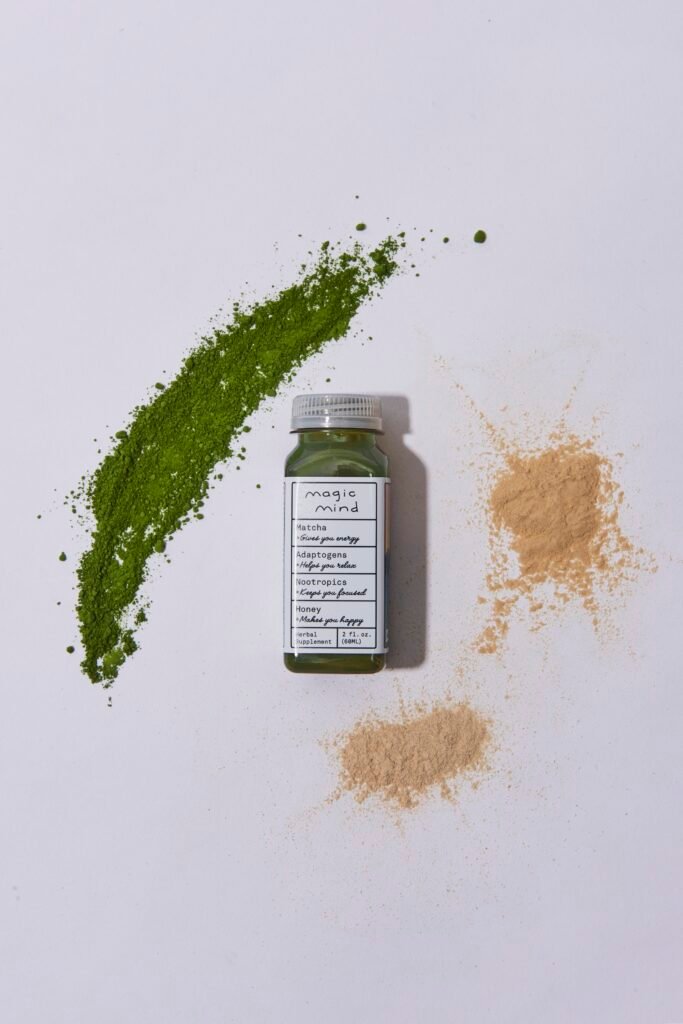If you’ve walked into a coffee shop or health food store recently, chances are you’ve come across matcha. This bright green powdered tea has gained popularity among health-conscious consumers, touted as a superfood packed with antioxidants and numerous health benefits. But does matcha live up to the hype? While research on its specific benefits is limited, experts agree that matcha, like green tea, can be a healthy addition to your diet. It contains high amounts of antioxidants that may protect the body’s cells from damage and reduce the risk of certain health problems. However, it’s important to be mindful of the amount of sugar and other unhealthy ingredients added to matcha-based drinks and treats, as they can counteract the potential benefits.

What is matcha?
Matcha is a type of powdered green tea that has been traditionally used in tea ceremonies in Japan, and has become popular in the United States and elsewhere. It comes from the same plant (Camellia sinensis) as other caffeinated teas, and is cultivated in an unusual way: The tea plant is shaded from excessive sunlight for much of its growing period so that it can produce more amino acids and biologically active compounds, like chlorophyll and theanine. Once the leaves are harvested, they’re ground into a fine powder.
Traditional use in tea ceremonies
In Japan, matcha has a long and esteemed history as an integral part of traditional tea ceremonies. The preparation and consumption of matcha during these ceremonies is a ritualized practice that has been passed down through generations. The tea is traditionally prepared by whisking the powdered matcha with hot water using a bamboo whisk called a chasen. This careful and deliberate process is meant to enhance the experience of drinking matcha and promotes a sense of calm and mindfulness.
Popular in the United States and elsewhere
In recent years, matcha has gained popularity outside of Japan, particularly in the United States. It has become a trendy beverage and ingredient, often seen in coffee shops, health food stores, and online recipes. Matcha is now commonly found in a variety of products, including lattes, milkshakes, sodas, hot chocolates, smoothies, and even desserts like ice creams and brownies. Its vibrant green color and unique flavor have made it a popular choice among health-conscious consumers.
Shading process and production of matcha
One of the key factors that sets matcha apart from other types of green tea is the shading process it undergoes during its cultivation. The tea plants used to produce matcha are shaded for several weeks before harvest, which slows down their growth and stimulates the production of certain compounds. This process increases the chlorophyll content in the leaves and enhances their vibrant green color. It also promotes the production of amino acids, particularly L-theanine, which contributes to matcha’s unique flavor profile. After harvesting, the leaves are carefully processed and ground into a fine powder, resulting in the final product known as matcha.
Does matcha have health benefits?
While the research on matcha’s health benefits is not yet definitive, experts suggest that matcha does contain high amounts of potentially beneficial compounds. Compared to other green teas, matcha has a higher concentration of ingredients because it is made from ground whole tea leaves. This concentration may contribute to its potential health effects.
Higher concentration of ingredients compared to other green teas
Typically, green tea leaves are steeped in hot water to make a beverage. In the case of matcha, however, the whole leaves are ground into a fine powder and consumed in its entirety. This means that when you drink matcha, you are ingesting the entire leaf, including all of its beneficial compounds. As a result, matcha has a higher concentration of antioxidants, amino acids, and other bioactive compounds compared to traditional steeped green tea.
Antioxidants as protective substances
One of the key benefits of matcha is its high antioxidant content. Antioxidants are substances that help to neutralize harmful molecules called reactive oxygen species (ROS) in the body. ROS can cause damage to our cellular membranes and contribute to the development of various health problems, including heart disease and cancer. By consuming matcha, which is rich in antioxidants, you may be able to counteract the harmful effects of ROS and protect your cells from damage.
Potential reduction in risk of heart disease and cancer
The antioxidants found in matcha have been associated with a reduced risk of certain health conditions, such as heart disease and cancer. Studies have shown that antioxidants can help to prevent the oxidation of LDL cholesterol, which is a key step in the development of heart disease. Additionally, antioxidants have been shown to have anti-cancer properties by inhibiting the growth of cancer cells and reducing inflammation in the body. While more research is needed to fully understand the impact of matcha on these conditions, the high concentration of antioxidants in matcha suggests that it may have potential health benefits in these areas.

Antioxidants in matcha
The high concentration of antioxidants in matcha is one of its most significant health-promoting features. These antioxidants play a crucial role in protecting our cells from damage and reducing the risk of various health problems.
Neutralizing harmful molecules
Antioxidants work by neutralizing harmful molecules called reactive oxygen species (ROS) in the body. ROS are highly reactive compounds that can cause damage to our cells and DNA if left unchecked. By neutralizing these harmful molecules, antioxidants help to prevent oxidative stress and maintain the overall health of our cells.
Protecting cellular membranes
The cellular membranes of our cells are essential for maintaining their structure and function. When our cellular membranes are damaged, it can lead to a variety of health problems. Antioxidants help to protect these membranes from oxidative damage, ensuring that our cells can function optimally and stay healthy.
Preventing downstream damaging events
When ROS are left unchecked, they can initiate a cascade of damaging events in our body. This cascade can lead to inflammation, DNA damage, and the development of chronic diseases. Antioxidants, such as those found in matcha, help to interrupt this destructive cascade and prevent further damage from occurring.
L-theanine in matcha
In addition to its antioxidant content, matcha also contains an amino acid called L-theanine. L-theanine is a unique component of green tea that is known for its potential cognitive and stress-reducing effects.
Potential cognitive performance improvement
Several studies have suggested that L-theanine may have a positive impact on cognitive performance. It has been shown to increase alpha brain wave activity, which is associated with a state of relaxed alertness and improved focus. Some research has also suggested that L-theanine may enhance attention, memory, and reaction time. While more studies are needed to confirm these findings, the potential cognitive benefits of L-theanine make matcha an intriguing beverage for those looking to boost their mental performance.
Possible stress reduction
L-theanine has been studied for its potential stress-reducing properties. It has been shown to promote a state of relaxation without causing drowsiness, making it an ideal component of matcha. Some studies have suggested that L-theanine can reduce subjective feelings of stress and anxiety and improve overall mood. However, it’s important to note that more research is needed to fully understand the effects of L-theanine on stress and anxiety in humans.
Limited evidence from animal and human studies
While the potential cognitive and stress-reducing effects of L-theanine are promising, it’s important to note that most of the research conducted so far has been in animals or small-scale human studies. Further research is needed to fully understand the potential benefits of L-theanine in matcha and its effects on cognitive performance and stress reduction in larger, more diverse populations.

Caffeine in matcha
Like all forms of tea, matcha contains caffeine. Although caffeine is often associated with negative health effects, it can actually have several positive impacts on our health when consumed in moderation.
Strong evidence for caffeine’s health benefits
Numerous studies have demonstrated the potential health benefits of caffeine. It has been shown to increase cognitive function and alertness, improve physical performance, and enhance mood. Additionally, regular consumption of caffeine, primarily from sources like coffee and tea, has been associated with a reduced risk of several diseases, including diabetes, heart disease, liver disease, and age-related cognitive decline.
Increased cognitive function and alertness
Caffeine is well-known for its stimulating effects on the central nervous system. It can increase wakefulness, improve concentration, and enhance cognitive function, including memory, attention, and reaction time. This is why many people rely on caffeine, such as that found in matcha, to help them stay focused and energized throughout the day.
Reduced risk of certain diseases
Regular consumption of coffee, which is the primary source of caffeine for many adults, has been associated with a reduced risk of several chronic diseases. Studies have shown that coffee drinkers have a lower risk of developing conditions such as type 2 diabetes, heart disease, liver disease, and age-related cognitive decline. While these studies have primarily focused on coffee, it’s reasonable to assume that the caffeine content in matcha could contribute to similar health benefits.
Is matcha healthy?
While there aren’t many specific studies that focus solely on matcha, the overall body of research on green tea suggests that it is a healthy beverage. Green tea has been extensively studied and has been associated with a wide range of health benefits. Because matcha is made from the same plant as green tea and is more concentrated, it’s reasonable to infer that matcha offers similar health benefits.
Limited specific studies on matcha
The research on the health benefits of matcha specifically is still relatively limited. Most of the studies conducted on matcha have focused on its antioxidant content and the potential benefits of specific compounds, such as L-theanine. While these studies suggest that matcha may have health-promoting effects, more research is needed to fully understand the specific impacts of matcha on our health.
Green tea’s overall health benefits
Green tea, in general, has been extensively studied and has been associated with several health benefits. Regular consumption of green tea has been linked to a reduced risk of various chronic diseases, including heart disease, certain types of cancer, and neurodegenerative disorders. Green tea has also been shown to improve cognitive function, promote weight loss, and enhance overall metabolism. These findings suggest that matcha, as a concentrated form of green tea, may offer similar health benefits.
Inference of similar benefits for matcha
Given the similarities between matcha and green tea, it is reasonable to infer that matcha offers similar health benefits. Matcha contains a higher concentration of beneficial compounds, such as antioxidants and L-theanine, compared to traditional steeped green tea. While more research specifically focusing on matcha is needed, the existing knowledge on green tea provides a strong foundation for understanding the potential health benefits of matcha.
Caution for individuals with caffeine sensitivity or heart conditions
While matcha can be a healthy addition to your diet, it is important to consider individual circumstances and potential sensitivities. Matcha contains caffeine, which can have stimulating effects on the central nervous system. Individuals with caffeine sensitivity or certain heart conditions should exercise caution when consuming matcha. Excessive caffeine intake may cause anxiety, disrupt sleep patterns, or contribute to heart irregularities in susceptible individuals. It is important to consult with a healthcare professional if you have any concerns about consuming matcha or any other caffeinated beverage.

Considerations for matcha consumption
When consuming matcha, it is important to practice mindful consumption and be aware of the potential impact of added sugars and unhealthful ingredients. While matcha itself is a healthy beverage, the additions that are often made when preparing matcha-based drinks or desserts can significantly alter its nutritional profile.
Mindful consumption of added sugars and unhealthful ingredients
Many matcha-based products, such as lattes, milkshakes, and desserts, may contain added sugars and other unhealthful ingredients. Excessive sugar intake has been linked to various health problems, including obesity, type 2 diabetes, and heart disease. To ensure you are getting the full health benefits of matcha, it is important to consume it in its purest form or choose options with minimal added sugars and unhealthful ingredients.
Counteraction of unhealthy choices
While matcha can be a healthy addition to your diet, it is important to remember that it cannot counteract the negative effects of an otherwise unhealthy lifestyle. If you regularly consume fast food, smoke cigarettes, or engage in other unhealthy habits, consuming matcha alone will not negate the detrimental impact of these choices. Matcha should be viewed as part of an overall healthy lifestyle that includes a balanced diet, regular physical activity, and other positive health behaviors.
Habitual matcha consumption for long-term health benefits
To fully experience the potential health benefits of matcha, it is important to make it a regular part of your diet. Consistency is key when it comes to reaping the benefits of any healthy habit. By incorporating matcha into your daily routine, you may gradually start to see improvements in your overall health and well-being. However, it is important to remember that matcha is just one component of a healthy lifestyle and should be complemented by other nutritious foods and behaviors.
Conclusion
Matcha is a valuable addition to the diet due to its high concentration of antioxidants, L-theanine, and caffeine. While more specific studies on matcha are needed, the existing research on green tea suggests that matcha offers similar health benefits. Antioxidants in matcha help to protect our cells from damage and reduce the risk of certain health problems, such as heart disease and cancer. L-theanine may have cognitive and stress-reducing effects, although more research is needed to fully understand its potential benefits. Caffeine in matcha can enhance cognitive function, alertness, and overall health when consumed in moderation. However, it is important to be mindful of added sugars and unhealthful ingredients when consuming matcha. Matcha should be viewed as part of an overall healthy lifestyle that includes a balanced diet, regular physical activity, and other positive health behaviors.

About the author
Annie Sneed is a science journalist who regularly contributes to The New York Times. With a background in science and a passion for communicating complex topics to the public, she has written for a variety of well-known publications including Scientific American, Wired, Public Radio International, and Fast Company. Annie Sneed is committed to providing accurate and reliable information to readers and helping them make informed decisions about their health and well-being.
Related articles
For more information on matcha and its health benefits, check out the following articles:








